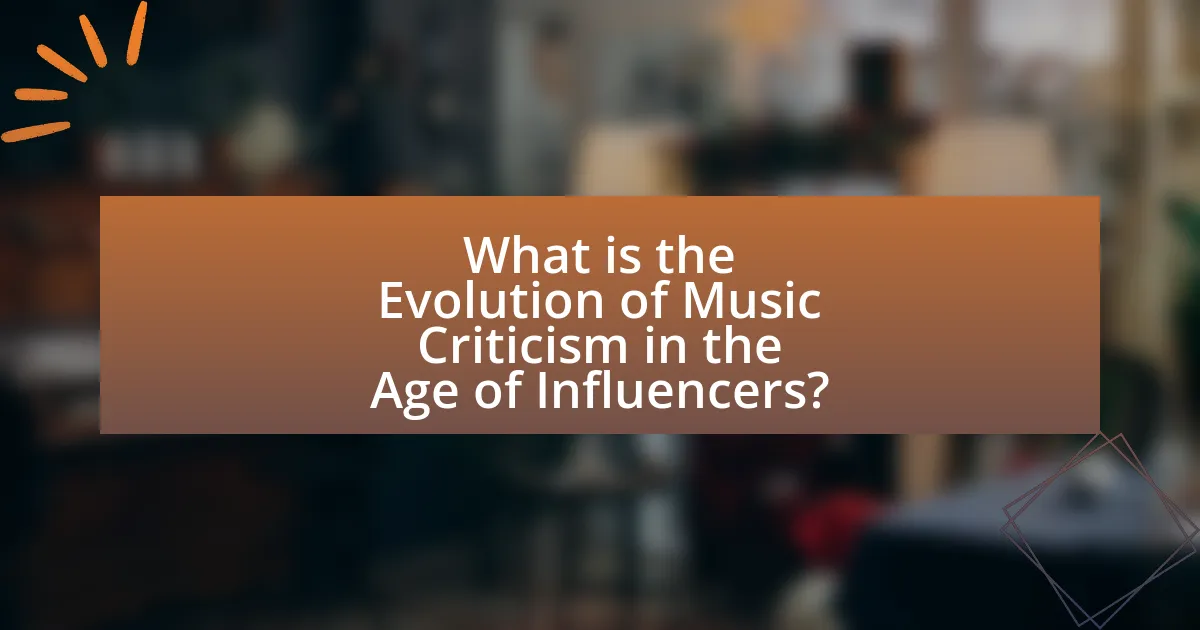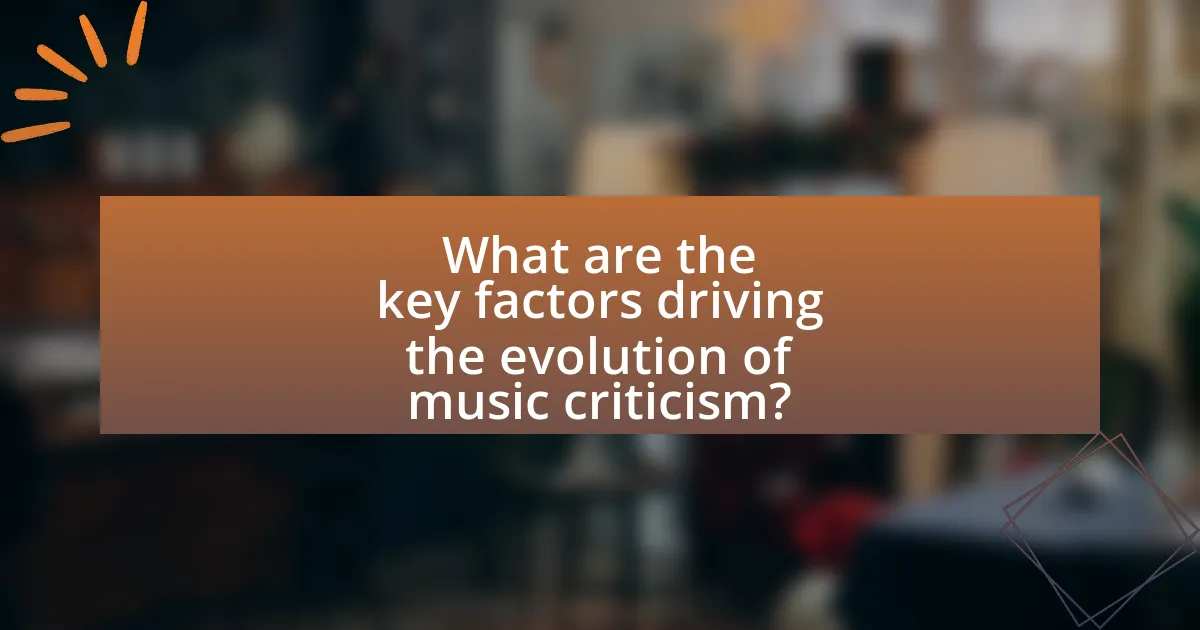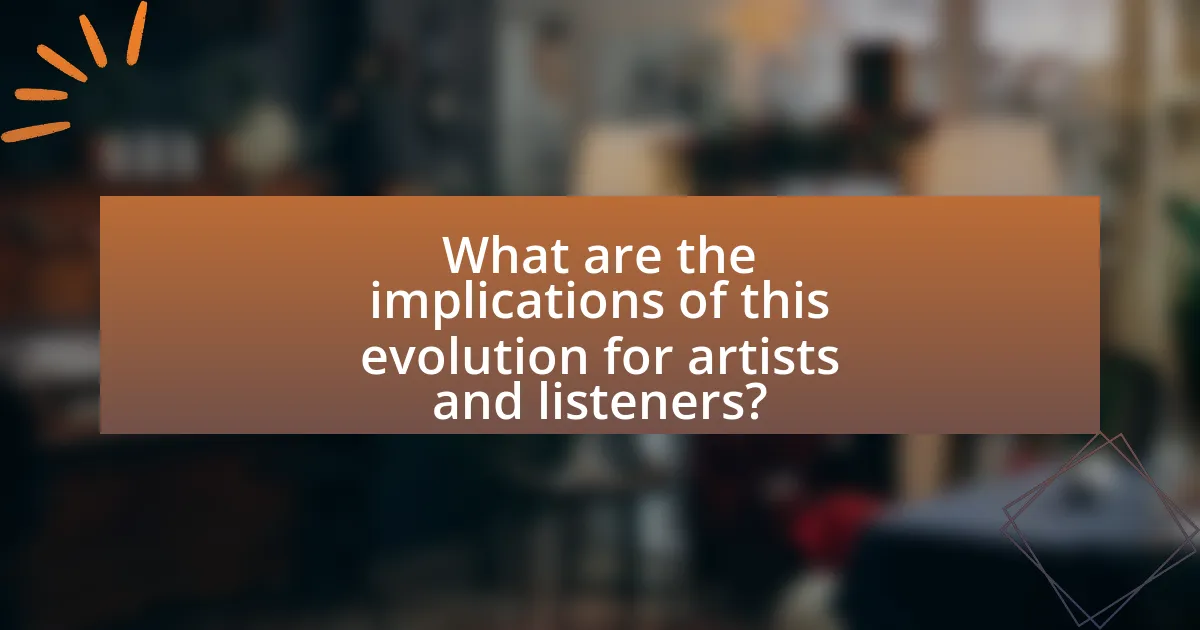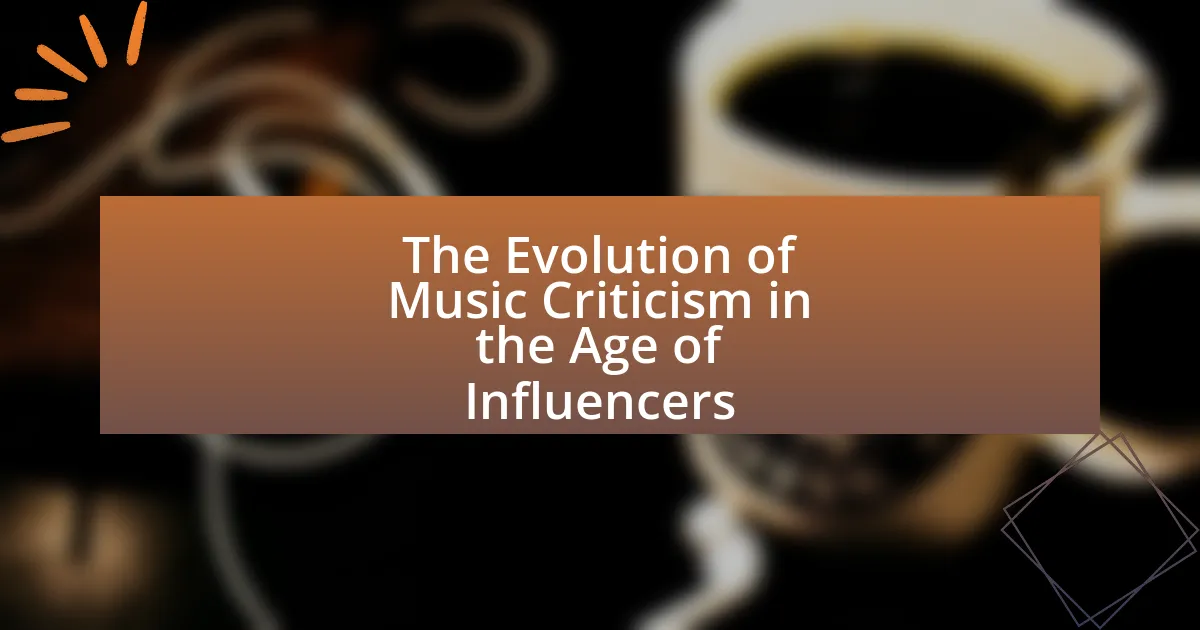The article examines the evolution of music criticism in the age of influencers, highlighting the transition from traditional media gatekeepers to a more democratized landscape shaped by social media platforms like Instagram, TikTok, and YouTube. It discusses how influencers have become pivotal in shaping public perception of music, often impacting trends and artist visibility without relying on conventional critics. Key factors driving this evolution include the rise of digital platforms, audience engagement, and the democratization of music access, which collectively reshape the landscape of music criticism. The article also addresses the implications for artists and listeners, emphasizing the importance of understanding this shift in navigating contemporary music consumption and criticism.

What is the Evolution of Music Criticism in the Age of Influencers?
The evolution of music criticism in the age of influencers has shifted from traditional media gatekeepers to a more democratized landscape where social media personalities play a significant role. Influencers, leveraging platforms like Instagram, TikTok, and YouTube, have gained substantial followings and can impact music trends and artist visibility, often bypassing conventional critics. This shift is evidenced by the rise of viral music challenges and trends that originate from influencer content, which can propel songs to mainstream success without traditional radio play or critical reviews. Additionally, influencers often provide immediate, relatable commentary that resonates with younger audiences, contrasting with the more formal and sometimes elitist tone of traditional music criticism.
How has music criticism changed with the rise of social media influencers?
Music criticism has shifted significantly with the rise of social media influencers, as these individuals now play a pivotal role in shaping public perception of music. Traditional music critics, often limited to print and established media outlets, have been supplemented by influencers who leverage platforms like Instagram, TikTok, and YouTube to share their opinions and recommendations. This democratization of music criticism allows for a broader range of voices and perspectives, often prioritizing personal experience and relatability over formal expertise.
For instance, influencers can rapidly disseminate their reviews to millions of followers, creating immediate impact and engagement that traditional critics may not achieve. According to a 2021 study by the Pew Research Center, 72% of teenagers reported that social media is a significant source of music discovery, highlighting the influence of these platforms on music consumption. This shift has led to a more interactive and participatory form of criticism, where audience feedback can directly influence an influencer’s content and the music industry at large.
What role do influencers play in shaping music opinions?
Influencers play a significant role in shaping music opinions by leveraging their social media platforms to promote artists, genres, and trends. Their endorsements can lead to increased visibility and credibility for musicians, often resulting in higher streaming numbers and sales. For instance, a study by the University of Southern California found that social media influencers can impact consumer behavior, with 49% of consumers relying on influencer recommendations for music choices. This demonstrates that influencers not only affect individual preferences but also contribute to broader shifts in music culture and industry dynamics.
How do traditional music critics view the influence of social media?
Traditional music critics generally view the influence of social media as a double-edged sword. On one hand, they acknowledge that social media platforms democratize music criticism, allowing a wider range of voices and opinions to emerge, which can enrich the discourse around music. For instance, platforms like Twitter and Instagram enable fans and emerging critics to share their insights instantly, fostering a more inclusive environment. On the other hand, traditional critics express concern that social media can lead to superficial engagement with music, prioritizing viral trends over in-depth analysis. This concern is supported by studies indicating that social media algorithms often favor sensational content, which may undermine the quality of music criticism.
Why is understanding this evolution important for music enthusiasts?
Understanding the evolution of music criticism is crucial for music enthusiasts because it shapes their perception of music and influences their listening experiences. As music criticism has transitioned from traditional forms to influencer-driven platforms, enthusiasts gain insights into how opinions, trends, and cultural contexts affect music consumption. This evolution highlights the shift in authority from established critics to social media influencers, which can alter the way music is marketed and received. For instance, a study by the Pew Research Center indicates that 72% of teens rely on social media for music recommendations, underscoring the impact of this shift on music preferences and discovery. Therefore, grasping this evolution allows enthusiasts to navigate the contemporary music landscape more effectively and critically engage with the content they consume.
What impact does influencer-driven criticism have on music discovery?
Influencer-driven criticism significantly impacts music discovery by shaping audience perceptions and preferences. Influencers, with their substantial social media followings, can amplify or diminish the visibility of music through their reviews and recommendations. For instance, a study by the University of Southern California found that music promoted by influencers saw a 30% increase in streaming numbers within a week of their endorsement. This demonstrates that influencer opinions can directly influence listener engagement and discovery of new artists and genres.
How does this evolution affect the credibility of music reviews?
The evolution of music criticism in the age of influencers diminishes the credibility of music reviews. As social media platforms enable influencers to share opinions widely, the reliance on personal taste over expert analysis often leads to biased or superficial reviews. For instance, a study by the Pew Research Center found that 72% of teens trust influencers more than traditional critics, indicating a shift in audience perception. This shift can result in music reviews that prioritize popularity and trends over informed critique, ultimately undermining the authority of established music critics.

What are the key factors driving the evolution of music criticism?
The key factors driving the evolution of music criticism include the rise of digital platforms, the influence of social media, and the democratization of music access. Digital platforms like streaming services have transformed how music is consumed, leading to a shift in criticism from traditional print media to online reviews and blogs. Social media allows critics and fans to engage directly, creating a more interactive dialogue about music. Additionally, the democratization of music access means that a wider range of voices can contribute to criticism, moving beyond established critics to include diverse perspectives from everyday listeners. These factors collectively reshape the landscape of music criticism, making it more immediate and inclusive.
How has technology influenced music criticism?
Technology has significantly influenced music criticism by democratizing access to music and enabling diverse voices to participate in the discourse. The rise of digital platforms, such as social media and music streaming services, has allowed critics and fans alike to share their opinions instantly and widely, shifting the traditional gatekeeping role of established music publications. For instance, platforms like YouTube and TikTok have given rise to new forms of criticism, where users create video reviews and commentary, often reaching larger audiences than traditional critics. Additionally, data analytics tools enable critics to analyze listener trends and preferences, providing a more informed basis for their reviews. This shift has led to a more inclusive and varied landscape of music criticism, reflecting a broader range of perspectives and tastes.
What platforms are most influential in music criticism today?
The most influential platforms in music criticism today are Pitchfork, Rolling Stone, and social media channels like Twitter and Instagram. Pitchfork is known for its in-depth reviews and has a significant impact on indie and alternative music, while Rolling Stone maintains authority in mainstream music journalism. Social media platforms, particularly Twitter and Instagram, allow critics and influencers to share opinions rapidly, shaping public perception and trends in real-time. These platforms collectively influence music discovery and critical discourse, reflecting the evolving landscape of music criticism in the digital age.
How do algorithms shape music recommendations and reviews?
Algorithms significantly shape music recommendations and reviews by analyzing user data to predict preferences and suggest content. Streaming platforms like Spotify and Apple Music utilize machine learning algorithms that consider listening history, user interactions, and demographic information to curate personalized playlists and recommend new artists. For instance, Spotify’s Discover Weekly playlist is generated using collaborative filtering and natural language processing, which aggregates data from millions of users to identify trends and similarities in music tastes. This data-driven approach not only enhances user engagement but also influences music reviews, as critics may reference popular algorithm-driven trends in their assessments, reflecting the broader listening habits shaped by these algorithms.
What cultural shifts have contributed to this evolution?
The cultural shifts that have contributed to the evolution of music criticism in the age of influencers include the rise of digital media, the democratization of content creation, and the changing dynamics of audience engagement. Digital media platforms, such as social media and streaming services, have transformed how music is consumed and discussed, allowing for immediate feedback and interaction between artists and listeners. The democratization of content creation has empowered individuals to share their opinions and critiques, leading to a diverse range of voices in music criticism that were previously marginalized. Additionally, the shift towards influencer culture has blurred the lines between traditional critics and everyday listeners, as influencers often shape public perception through their platforms, making music criticism more accessible and varied. These shifts reflect broader societal changes in communication and consumption patterns, emphasizing the importance of community and personal connection in the music landscape.
How has the democratization of music criticism changed the landscape?
The democratization of music criticism has significantly altered the landscape by enabling a broader range of voices to participate in the discourse surrounding music. This shift has led to a more diverse array of opinions and perspectives, as platforms like social media and music streaming services allow anyone with internet access to share their thoughts and reviews. For instance, the rise of user-generated content on platforms such as YouTube and TikTok has empowered amateur critics to influence public perception and artist visibility, often rivaling traditional critics. This change is evidenced by the fact that many emerging artists gain traction through viral social media reviews rather than conventional media outlets, illustrating a shift in how music is consumed and critiqued.
What role does audience engagement play in modern music criticism?
Audience engagement plays a crucial role in modern music criticism by shaping the discourse around music and influencing critics’ perspectives. In the digital age, platforms like social media allow audiences to interact directly with critics and artists, creating a feedback loop that can alter the reception of music. For instance, the rise of user-generated content and reviews on platforms such as Pitchfork and Metacritic demonstrates how audience opinions can sway critical consensus and impact an artist’s success. This engagement not only democratizes music criticism but also holds critics accountable to the audience, as their reviews can be challenged or supported by public sentiment.

What are the implications of this evolution for artists and listeners?
The evolution of music criticism in the age of influencers significantly impacts both artists and listeners by altering how music is promoted and consumed. Artists now rely heavily on social media platforms and influencer endorsements to reach wider audiences, which can lead to increased visibility and potential revenue. For instance, a study by the Pew Research Center indicates that 72% of teenagers use platforms like TikTok for music discovery, highlighting the shift from traditional media to digital influencers.
Listeners benefit from this evolution through greater access to diverse music genres and emerging artists, as influencers often curate content that reflects varied tastes. This democratization of music discovery allows listeners to engage with a broader spectrum of sounds and styles, fostering a more inclusive music culture. Overall, the implications of this evolution create a dynamic interplay between artists and listeners, reshaping the landscape of music consumption and promotion.
How do artists respond to influencer-driven music criticism?
Artists often respond to influencer-driven music criticism by engaging directly with the feedback, either through social media interactions or by addressing critiques in their work. For instance, many musicians utilize platforms like Twitter and Instagram to clarify their artistic intentions or to express gratitude for positive reviews, demonstrating a willingness to connect with their audience. Additionally, some artists may adapt their musical style or marketing strategies based on the feedback received from influencers, reflecting the significant impact of this form of criticism on their creative decisions. This responsiveness highlights the evolving relationship between artists and critics in the digital age, where influencers play a crucial role in shaping public perception and artist reputation.
What strategies do artists use to engage with influencers?
Artists engage with influencers through targeted collaborations, social media campaigns, and personalized outreach. By collaborating with influencers, artists can leverage their audience to gain visibility and credibility. Social media campaigns often involve creating shareable content that resonates with the influencer’s followers, enhancing engagement. Personalized outreach, such as direct messages or tailored content, fosters a genuine connection, increasing the likelihood of influencers promoting the artist’s work. These strategies are effective as they align the artist’s brand with the influencer’s established audience, leading to increased reach and potential fanbase growth.
How does influencer criticism affect an artist’s career trajectory?
Influencer criticism can significantly alter an artist’s career trajectory by shaping public perception and influencing audience engagement. When influencers critique an artist’s work, their large followings can amplify both positive and negative feedback, leading to increased visibility or potential backlash. For instance, a negative review from a prominent influencer can result in a decline in streaming numbers and concert attendance, as seen with artists like Lil Nas X, whose career faced scrutiny from influencers that affected his marketability. Conversely, favorable influencer endorsements can enhance an artist’s reputation and lead to greater opportunities, such as collaborations and sponsorships, exemplified by Billie Eilish, who gained substantial traction through influencer support. Thus, influencer criticism plays a pivotal role in determining an artist’s success and longevity in the music industry.
What should listeners consider when consuming music criticism today?
Listeners should consider the credibility and background of the critic when consuming music criticism today. Critics often have varying levels of expertise, experience, and biases that can influence their perspectives. For instance, established critics may have a history of insightful analysis, while influencers might prioritize popularity over substance. Additionally, understanding the context in which the criticism is presented, such as the critic’s personal taste or the platform’s audience, can provide valuable insight into the review’s reliability. This awareness helps listeners navigate the diverse landscape of music criticism shaped by social media and influencer culture.
How can listeners discern credible reviews from biased opinions?
Listeners can discern credible reviews from biased opinions by evaluating the reviewer’s expertise, checking for specific details, and analyzing the language used. Expertise is crucial; credible reviewers often have a background in music or a history of objective criticism. Specific details about the music, such as instrumentation, lyrical themes, and production quality, indicate a deeper understanding, while vague or overly emotional language may suggest bias. Additionally, cross-referencing multiple reviews can provide a broader perspective, helping to identify consistent themes and opinions that lend credibility to the assessment.
What best practices can listeners adopt to navigate music criticism in the influencer age?
Listeners can adopt several best practices to navigate music criticism in the influencer age by critically evaluating sources, diversifying their information intake, and engaging with music actively. First, listeners should assess the credibility of influencers and critics by researching their backgrounds, expertise, and potential biases, as this helps in distinguishing between informed opinions and promotional content. Second, diversifying information sources, such as exploring various platforms and genres, allows listeners to gain a well-rounded perspective on music, reducing the influence of any single critic or trend. Lastly, actively engaging with music through personal listening experiences and discussions with others fosters independent judgment, enabling listeners to form their own opinions rather than relying solely on influencer narratives. These practices empower listeners to navigate the complex landscape of music criticism effectively.
